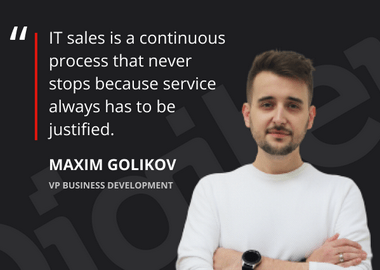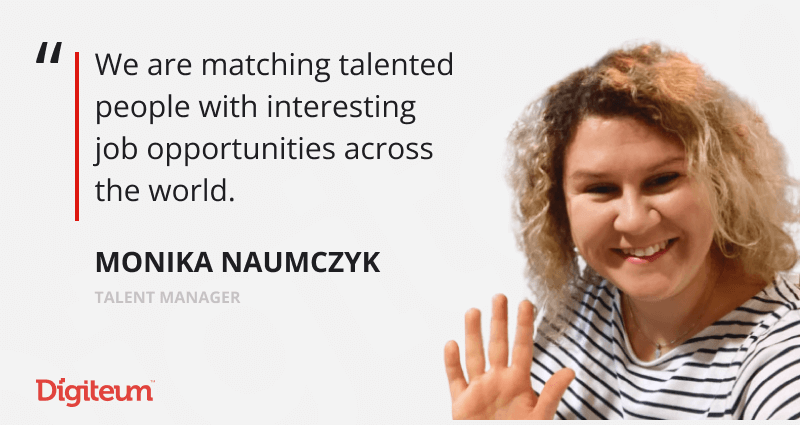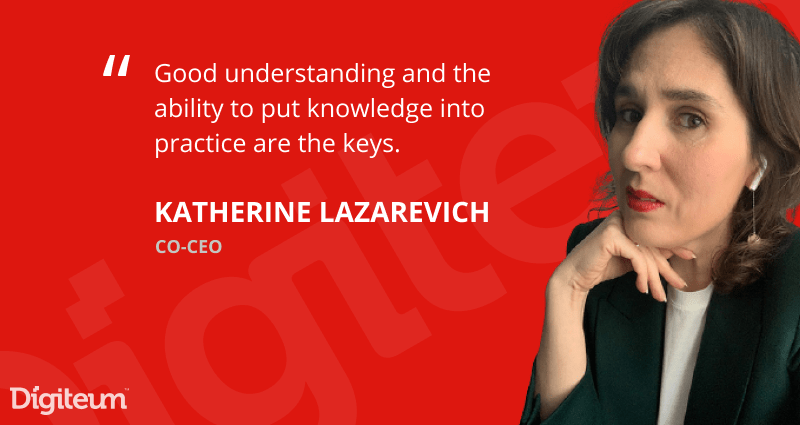Digiteum Talks: The Secret World of IT Sales
Roman Rimsha and Maxim Golikov talk about setting up an effective sales infrastructure and workflow, key roles and mentorship in IT sales.
Roman Rimsha and Maxim Golikov are widely known as experts in IT sales. Both Maxim and Roman are Sales Operations and Business Development executives, consultants and mentors with more than 20 years of combined experience in this field.
Today they lead, above all, the Sales Department at Digiteum and help create and maintain an enabling environment for the company’s steady growth. They set up a self-sufficient functional department and established an effective sales process. In only two years, their team onboarded about a dozen new clients from Europe, Canada and the U.S.
We talked to Roman and Maxim about their approach to IT sales, strategy for building up an effective sales team and how they spot and train sales people bound to succeed.
Maxim, Roman, tell us your story
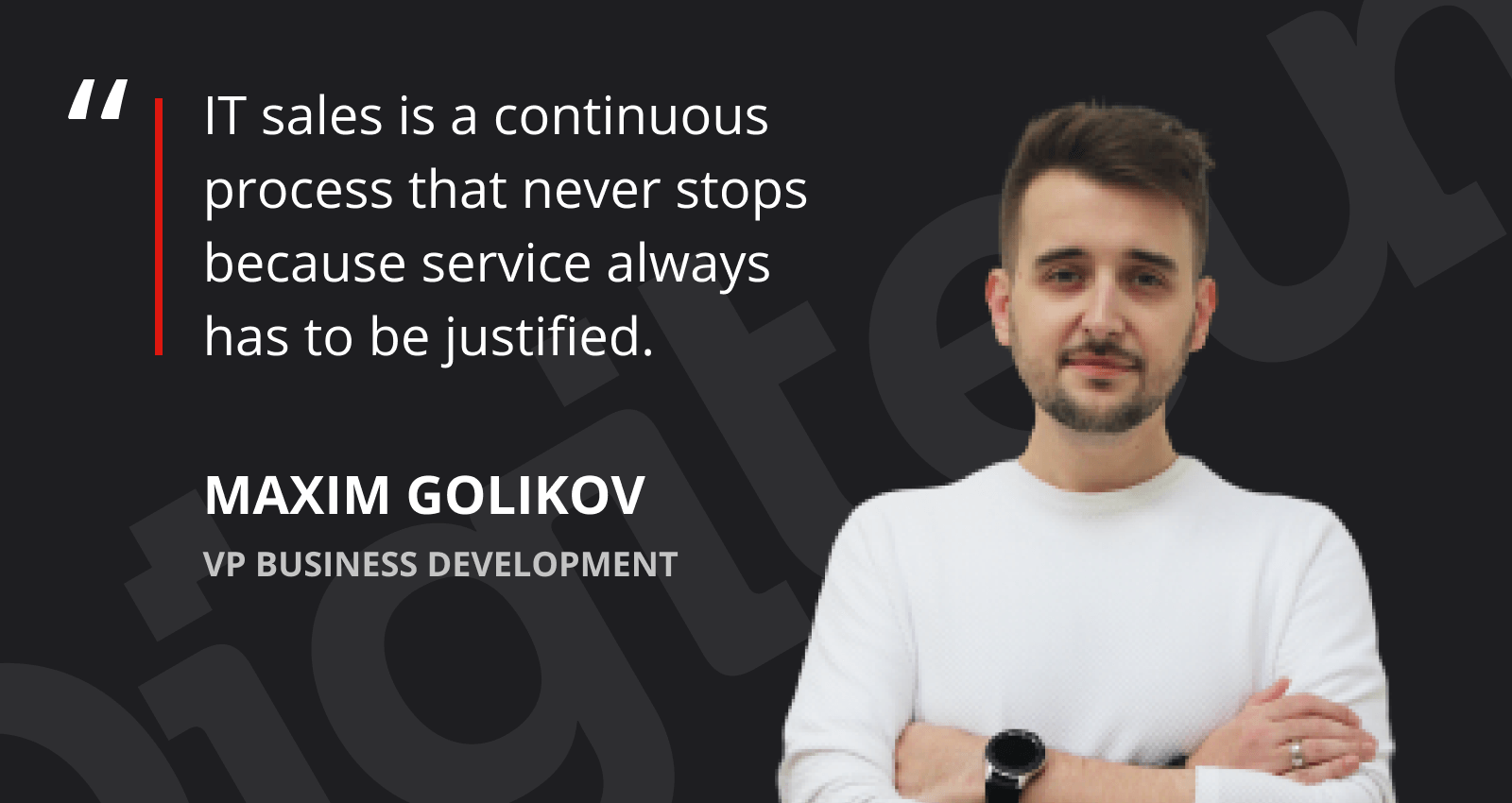
Maxim: My first sales-related job was connected to selling industrial meat grinders. I remember bringing over my first client, a Finnish company that designed storage containers, to our factory and showing them around.
I was still at the university when I began studying engineering. Then I moved from Israel to Belarus and, since I was already speaking three languages, I took on linguistics. I worked in logistics and transportation until I finished my studies.
Roman hired me straight after to work in one of the IT companies he was with back then. The company was 80-people strong at that time. Roma’s job was focused on growing the company internationally. In only a few years, we grew to 250 people, give or take. During these years, we have learned a lot about building departments, managing people, facing challenges and establishing business relationships all over the globe.
At some point, Roman decided to move to Lithuania and began working for a global adtech company, and I stayed with the same company for some time. After a while, when we already had a robust experience in sales, we decided to go our own way and began consulting other companies.
My strengths have always been tools, systems and rules, while Roma is more focused on vision, building relationships and general business knowledge and understanding.
We worked with many companies across CIS, Europe, Australia, America and saw how things work from different perspectives. We learned how people, industries and companies solve their challenges.
One of our most trusted and closest clients is Digiteum. We have been working together for more than 2 years already. Our relationships have transformed from consulting to partnership, and we became the heads of business development here. We bring in the mish-mash of our experience and try to build something acceptable for Mike and Kate (Michael Grebennikov and Katherine Lazarevich, Digiteum co-founders and co-CEOs).
Roman, would you like to add anything?
Roman: Max covered almost everything. I would only add that before starting my journey in sales, I used to work as a software engineer, then moved on with team management, product management and so on, and only then jumped into business development. So I covered almost all the bases in this field.
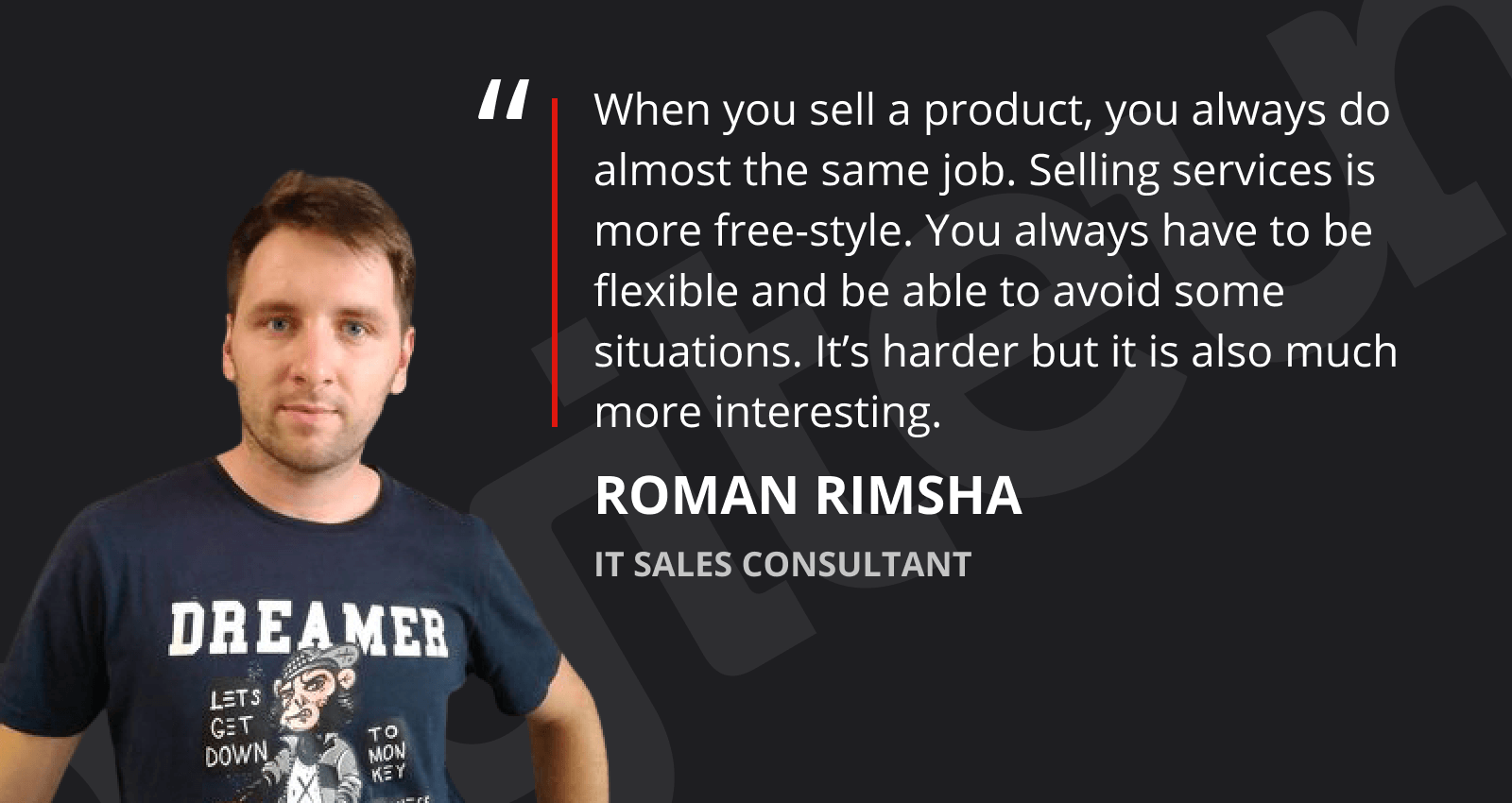
How does the Sales Department at Digiteum work? Tell us about the structure and process.
Roman: Let me start with a note that the structure and process have already changed two or three times.
Maxim: At first, we had a stable Lead Generation Department. Its sole purpose was to provide leads. It has given us a steady stream of leads and allowed us to sign off deals at regular intervals for as long as we have been working together.
Lately, we have been repurposing the department to scale up and transform it into something that will be able to sustain this growth. We have been growing in terms of infrastructure and had people in charge of lead generation. Their job was to find leads, talk to them, get them to talk to us and then just to facilitate the communication between different stakeholders. Now, our focus is shifting towards sales development roles. We have established a Data Research Department responsible for the research and prequalification of the future leads. These leads are then transferred to SDRs (Sales Development Representatives).
SDRs work with the data that is already being provided, so they do less research and focus more on building business relationships and establishing potential opportunities. This role covers presales, a part of the sales process and stops at account management.
Currently, we need to scale up this particular role. We have many incoming data streams and we aren’t able to process them all. To make it efficient and realize our potential, we need additional skilled and talented people who could help make the most out of the data we provide.
Looking for opportunities in IT Sales? We’ve got plenty. Check Sales Development Representative or contact our Talent Team directly at [email protected] to start a chat.
Who are these talented people? How do they qualify for this role? Also, what do sales professionals outside IT need to know about SDR’s job to get on board?
Maxim: There are several layers to this. Depending on where people are coming from, they may face different challenges at different stages. First of all, our work is B2B, so people who used to work in B2C need to first understand this difference. I won’t go into detail, but the main point is to focus on business.
There is also a gap for the people who come from general B2B sales. If we talk about outstaff or outsource services, we first of all focus on the service. It’s not the same as selling products or things. IT sales is a continuous process that never stops because service always has to be justified.
Roman: When you sell a product, you always do almost the same job. It’s always the same type of clients, the same questions. Selling services is more free-style. It’s hard to predict what questions will pop up. You always have to be flexible and be able to avoid some situations. It’s harder but it is also much more interesting.
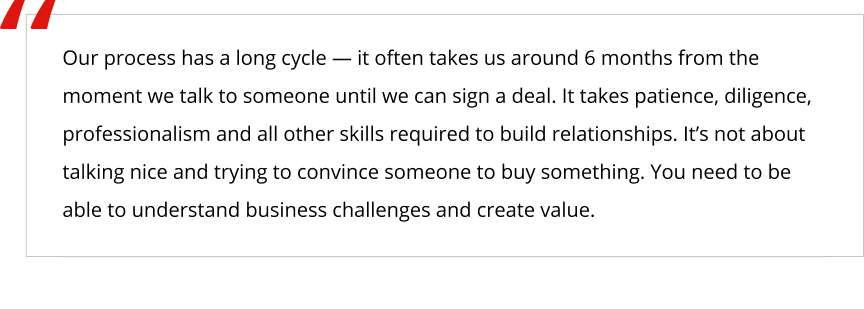
Maxim: Even people who have sold services before, SaaS, for example, find it difficult to understand that they don’t control what they sell. We can’t produce or manufacture software engineers or the result of their work. Sales teams can’t fully control the result and quality of the service they sell — it falls on the team, part of which are the clients themselves. This is the game that makes you always be on the same page with the people you work with. And in sales, you work with everybody: developers, managers, marketers, heads of departments and everybody else.
At the end of the day, the sales process for IT service companies is one of the most complex ones. It has high requirements for the people who work in it, but at the same time, the potential is almost limitless. Services can be scaled indefinitely. A single client may generate more revenue than all the previous clients in the history of one company, and it isn’t far-fetched. Many SMB IT companies that don’t have an established sales process have one or two clients who keep them going.
We can’t rely on this. We have a steady stream of new business coming in, and we rather focus on creating more potential to sell than trying to stay afloat.
Our process has a long cycle — it often takes us around 6 months from the moment we talk to someone until we can sign a deal. It takes patience, diligence, professionalism and all other skills required to build relationships. It’s not about talking nice and trying to convince someone to buy something. The process is too long and too complex to be able to convince all the people all the time. You need to be able to understand business challenges and create value. It’s a nice trade but it often doesn’t lead to immediate success.
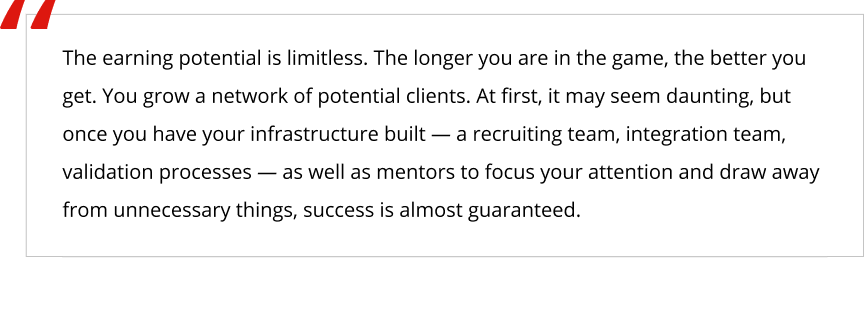
Maxim: Another complexity in our niche is that you have to sell twice. First, you have to sell to your client and then you also have to sell it internally — to developers, managers, recruiters. We saw many successful sales people forget about it thinking that once they bring a client, you just have to take it.
Roman: But there are not only complexities. The good part is that you get into a worldwide market, learn quickly, start to understand business and make money.
Maxim: True, you work with businesses across the world, you get to talk to people from different industries. The learning and earning potential is limitless. The longer you are in the game, the better you get. You grow a network of potential clients. At first, it may seem daunting, but once you have your infrastructure built — a recruiting team, integration team, validation processes — as well as mentors to focus your attention and draw away from unnecessary things, success is almost guaranteed.
By the end of the day, we rely on statistics, on math. We know exactly how many clients we need to contact to sign a contract, how we need to work with every potential client before they are ready to strike a deal.
What newcomers need to look for before getting into this field is this support and infrastructure. Is there a possibility to hire people, switch projects, tap into people’s experience and get guidance? All this makes a successful sales person in the end.

Roman: It’s also important to work with the executives who know what they want. When management just hires a sales team and doesn’t set any expectations or doesn’t know what type of result they want to get, things get complicated.
One more a bit philosophical thing I want to add. We all know that there is a good divide between hard and soft skills. In sales, it’s a bit tricky, because it’s not really formalized.
Obviously, a sales person should have strong soft skills. At the same time, we are also trying to define what hard skills we are looking for. It could be a technical skill, competence in product delivery and management. It could be business-focused skills and experience in talking to C-level executives. It could even be specific industry knowledge.
When a person has the right combo of both soft and hard skills, there’s a good chance of success. It’s important to understand, however, what hard skills you need to have and how to use them right.
Why should people consider joining your sales team and becoming a part of such a long and complex process?
Maxim: Because they would work with us. We know and understand how things work and it often allows us to be more efficient than other companies.
Not many people in this market understand sales. Many companies just throw people at it and expect to magically get clients. For example, it’s not uncommon today to see companies choose a very generic approach saying something like: “We want to work with Europe or the U.S. You are a sales person — find a solution.”
Often sales people are lead by people who are not sales people themselves — business managers, directors, developers, but very rarely sales people.
We, on the other hand, understand the specifics of the market, fears and strengths of the people we are trying to reach.
How do you mentor people? And what does mentorship even mean in sales?
Maxim: Our processes are complex and long. At the same time, every new talent joining the team is an individual case. So one of the biggest benefits we provide is that we can adapt to people. There’s no one-size-fits-all program because everybody has strengths, weaknesses, hard and soft skills. It’s difficult to unify training.
What we do is leading and guiding people every step of the way. We try to be there and help them prioritize, build communication, make calls, write effective emails and explain the logic behind working approaches. We share statistics and knowledge we have gained, let people make mistakes and then correct these mistakes together.
We can’t do it for everyone. For instance, when I teach a course, I can usually cover just a few topics because I simply don’t have the time to cover everything. Here at Digiteum, both Roma and I dedicate our time every single day to help our sales people perform better and thus help them improve their chances to succeed.
At the end of the day, we are goal-oriented, we have specific goals in terms of revenue and profit and we are not interested in holding our people back. We want and need them to grow. This is why we are trying to devote as much time as we can for training, role plays and support.
So it’s an ongoing process that goes way beyond onboarding?
Maxim: Yes, if people need it. One of the core principles we operate on is to let people do the work they were hired for. If our people need help, we are there for them. When they are good on their own and we see that they are effective enough, we step aside and let them do the job.

What are your goals for 2021? Everyone is talking about pent-up demand and the market is being crazy. Are you going to act on it?
Maxim: Yes and no. We are kind of in the middle and always have to balance. On one hand, there is increased demand, and it is true. This is the delayed demand that resulted from last year’s slow-down for some companies. Now everyone is going all-out.
At the same time, the demand in the job market is also increased. It is more complex to find the right people for the right clients. Thus, we don’t have as easy access to talent compared to a couple of years ago. Demand increased on both sides and we are operating with as many complexities as we had before.
For example, the U.S. market has become nearly unreachable because all local presence there moved online so as the rest of the world. Right now everyone is targeting this huge market. We, on the other hand, have shifted our focus from the US to Germany and the DACH region in general since we now have a new office in Poland and it will be easier to build relationships here. Our timezone, culture and rates are acceptable there.
As for the goals, we are focused on strategic rather than numerical goals right now. We focus on getting clients from the DACH region and growing our Polish office and presence there. Generally, we are trying to increase efficiency and get more results from sales, recruitment and development departments. The ultimate goal is to be able to close deals on the regular basis.
You work with many companies and clients. What was special in Mike and Kate that made you stay with Digiteum?
Maxim: Excellent questions. Roma and I could work anywhere, the doors are open. The only natural limit for us is our time.
However, we have always had a deciding factor — what we call hygiene. It refers to how comfortable it is for us to work with a client. Do we see the situation from the same angle? Do our goals match? Or on the contrary, is there a constant clash in values and interests?
We are on the same page with Kate and Mike. We have the same understanding of the market and business development. We feel comfortable with each other and thus can do more. After all, every partnership thrives in such an environment.
IT sales is indeed a world full of secrets, and it seems we have managed to scratch the surface and reveal some of them. If you see yourself being a part of this stellar sales team working with best-in-class experts, strategies and tools, go ahead and check our open position — Sales Development Representative. Or contact our Talent Manager at [email protected] to learn more about our Sales Department and teams.


